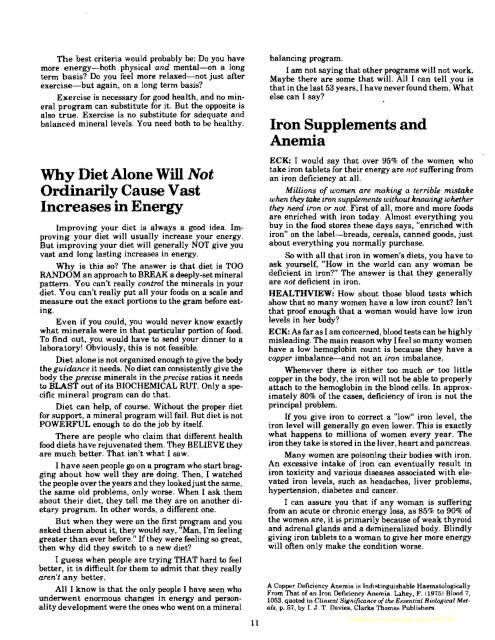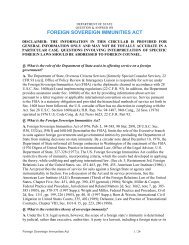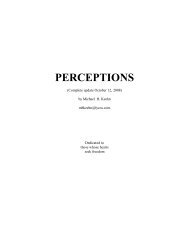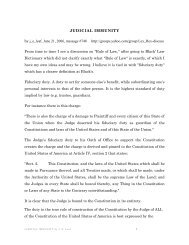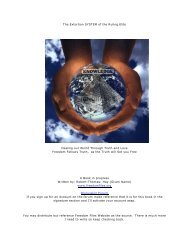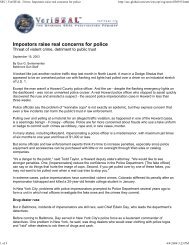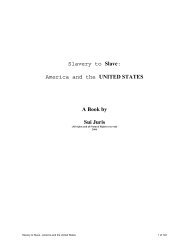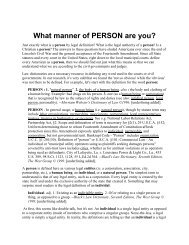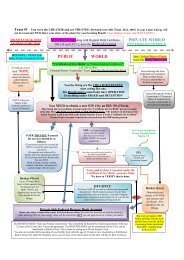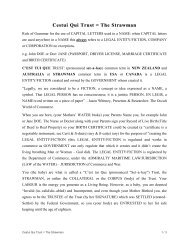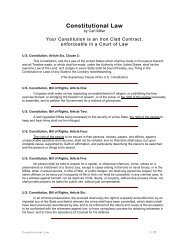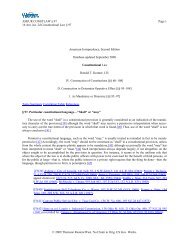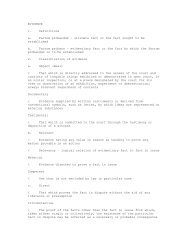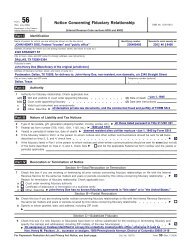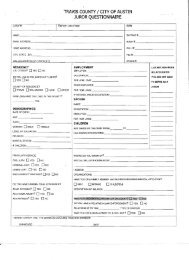The Healthview Newsletter, Issue #27-29 - Freedom School
The Healthview Newsletter, Issue #27-29 - Freedom School
The Healthview Newsletter, Issue #27-29 - Freedom School
You also want an ePaper? Increase the reach of your titles
YUMPU automatically turns print PDFs into web optimized ePapers that Google loves.
<strong>The</strong> best criteria would probably be: Do you have<br />
more energy-both physical and mental-on a long<br />
term basis? Do you feel more relaxed-not just after<br />
exercise--but again, on a long term basis?<br />
Exercise is necessary for good health, and no mineral<br />
program can substitute for it. But the opposite is<br />
also true. Exercise is no substitute for adequate and<br />
balanced mineral levels. You need both to be healthy.<br />
Why Diet Alone Will Not<br />
Ordinarily Cause Vast<br />
Increases in Energy<br />
Improving your diet is always a good idea. Improving<br />
your diet will usually increase your energy.<br />
But improving your diet will generally NOT give you<br />
vast and long lasting increases in energy.<br />
Why is this so? <strong>The</strong> answer is that diet is TOO<br />
RANDOM an approach to BREAK a deeply-set mineral<br />
pattern. You can't really control the minerals in your<br />
diet. You can't really put all your foods on a scale and<br />
measure out the exact portions to the gram before eating.<br />
Even if you could, you would never know exactly<br />
what minerals were in that particular portion of food.<br />
To find out, you would have to send your dinner to a<br />
laboratory! Obviously. this is not feasible.<br />
Diet alone is not organi2ed enough to give the body<br />
the guidance it needs. No diet can consistently give the<br />
body the precise minerals in the precise ratios it needs<br />
to BLAST out of its BIOCHEMICAL RUT. Only a specific<br />
mineral program can do that.<br />
Diet can help, of course. Without the proper diet<br />
for support, a mineral program will fail. But diet is not<br />
POWERFUL enough to do the job by itself.<br />
<strong>The</strong>re are people who claim that different health<br />
food diets have rejuvenated them. <strong>The</strong>y BELIEVE they<br />
are much better. That isn't what I saw.<br />
I have seen people go on a program who start bragging<br />
about how well they are doing. <strong>The</strong>n, I watched<br />
the people over the years and they lookedjust the same,<br />
the same old problems, only worse. When I ask them<br />
about their diet, they tell me they are on another dietary<br />
program. In other words, a different one.<br />
But when they were on the first program and you<br />
asked them about it, they would say, "Man, I'm feeling<br />
greater than ever before." If they were feeling so great,<br />
then why did they switch to a new diet?<br />
I guess when people are trying THAT hard to feel<br />
better, it is difflcult for them to admit that they really<br />
aren't any better.<br />
All I know is that the only people I have seen who<br />
underwent enonnous changes in energy and personality<br />
development Were the ones who went on a mineral<br />
11<br />
balancing program.<br />
I am not saying that other programs will not work.<br />
Maybe there are some that will. All I can tell you is<br />
that in the last 53 years, I have never found them. What<br />
else can I say?<br />
Iron Supplements and<br />
Anemia<br />
ECI{: I would say that over 95% of the women who<br />
take iron tablets for their energy are not suffering from<br />
an iron deficiency at all.<br />
Millions of women (1re making (1 terrible mistoke<br />
when they take iron supplements witlwut knowing whether<br />
they need iron or not. First of all, more and more foods<br />
are enriched with iron today, Almost everything you<br />
buy in the food stores these days says, "enriched with<br />
iron" on the label-breads, cereals, canned goods, just<br />
about everything you normally purchase.<br />
So with all that iron in women's diets, you have to<br />
ask yourself, "How in the world can any woman be<br />
deficient in iron?" <strong>The</strong> answer is that they generally<br />
are not deficient in iron.<br />
HEALTHVIEW; How about those blood tests which<br />
show that so many women have a low iron count? Isn't<br />
that proof enough that a woman would have low iron<br />
levels in her body?<br />
ECK: As far as I am concerned, blood tests can be highly<br />
misleading. <strong>The</strong> main reason why I feel sO many women<br />
have a low hemoglobin count is because they have a<br />
copper imbalance-and not an iron imbalance.<br />
Whenever there is either too much or too little<br />
copper in the body, the iron will not be able to properly<br />
attach to the hemoglobin in the blood cells. In approximately<br />
80% of the cases, deficiency of iron is not the<br />
principal problem.<br />
If you give iron to correct a "low" iron level, the<br />
iron level will generally go even lower. This is exactly<br />
what happens to millions of women every year. <strong>The</strong><br />
iron they take is stored in the liver, heart and pancreas.<br />
Many women are poisoning their bodies with iron.<br />
An excessive intake of iron can eventually result in<br />
iron toxicity and various diseases associated with elevated<br />
iron levels, such as headaches, liver problems,<br />
hypertension, diabetes and cancer.<br />
I can assure you that if any woman is suffering<br />
from an acute or chronic energy loss, as 85% to 90% of<br />
the women are, it is primarily because of weak thyroid<br />
and adrenal glands and a demineralized body. Blindly<br />
giving iron tablets to a woman to give her more energy<br />
will often only make the condition worse.<br />
A Copper Deficiency Anemia is Indistinguishable Haematologically<br />
From That of an Iron Deficiency Anemia. Lahey, F. \1975) Blood 7,<br />
1053, quoted in Clinical Significance ofthe Essential Biological Metals,<br />
p. 57, by 1. J. T. Davies, Cla.rke Thomas Publishers.<br />
<strong>Healthview</strong> Newsletetr, <strong>Issue</strong> <strong>#27</strong>-<strong>29</strong>


